Kichler Lighting 35164 Manuel utilisateur
- Catégorie
- Ventilateurs ménagers
- Taper
- Manuel utilisateur

ITEM #0838007
MODEL #35164
CEILING FAN
1
Kichler® is a registered trademark of
The L.D. Kichler Co. All Rights Reserved.
ATTACH YOUR RECEIPT HERE
Serial Number
Purchase Date
Questions, problems, missing parts? Before returning to your retailer, call our customer
service department at 1-800-554-6504, 8 a.m. - 4:30 p.m, EST, Monday - Friday.
Français p. 12
Español p. 23

PACKAGE CONTENTS
2
Hanging Bracket 1
Motor Assembly 1
Canopy 1
Blade Coupling 3
Blade 3
A
B
C
D
E
PART DESCRIPTION QUANTITY
A
C
D
E
B

HARDWARE CONTENTS
3
SAFETY INFORMATION
Please read and understand this entire manual before attempting to assemble, operate or install the
product.
WARNING:
• Important: When using an existing outlet box, be sure the box is securely attached to the building
structure and can support the full weight of the fan. Failure to do so can result in serious injury or
death.
• Turn off circuit breakers and wall switch to the fan supply wire leads. Warning: Failure to
disconnect power supply prior to installation may result in serious injury or death.
• Warning - Connecting this fan to a light switch (on/off) has been known to cause damage to the
receiver. This fan must be wired to continually receive power. Failure to do so will drastically
reduce the lifespan of this fan.
• WARNING – To Reduce The Risk Of Fire, Electric Shock, Or Personal Injury, Mount To Outlet Box
Marked 'Acceptable for Fan Support of 15.9 kg (35 lbs) or less' And Use Mounting Screws
Provided With The Outlet Box and/or Support Directly From Building Structure. Most Outlet Boxes
Commonly Used For The Support of Luminaires Are Not Acceptable For Fan Support And May
Need To Be Replaced. Consult A Qualified Electrician If In Doubt."
• Important: Be sure wiring box is properly grounded or that a ground (green) wire is present.
• Make sure the installation site you choose allows a minimum of 7 feet from the floor to the end of
the blades.
Hanging bracket Screw
Hanging bracket Washer +
Tooth Washer
Wire Connector
Fan Blade Screws and Washers
HARDWARE BAG REMOTE CONTROL
Remote Control
Remote Cradle
Remote Cradle Screw
Battery
Lag Screw
Balance Kit
Flat Washer and Spring Washer
Hex Nut and Flat Washer

WARNING (continued)
CAUTION:
PREPARATION
4
Before beginning assembly of product, make sure all parts are present. Compare parts with package
contents list and diagram. If any part is missing or damaged, do not attempt to assemble the product.
Contact customer service for replacement parts.
Estimated assembly time: 30 minutes to 1 hour.
Tools Required for Assembly (not included): Phillips screwdriver, flathead screwdriver, wire strippers,
electrical tape, ladder, safety glasses.
A B C
ASSEMBLY INSTRUCTIONS
• WARNING-To reduce risk of fire, electric shock, or personal injury, mount to outlet box marked
“Acceptable for Fan Support of 15.9kg (35lbs) or less” and use mounting screws provided with the
outlet box and/or support directly from building structure. Most outlet boxes commonly used for
the support of luminaries are not acceptable for fan support and may need to be replaced.
Consult a qualified electrician if in doubt.
• Warning-Risk of fire, electric shock, or personal injury. Ceiling fans may be either directly
supported from a structural framing member of a building and (see examples in figures A & B) or
may be mounted to an outlet box marked acceptable for fan support of 31.8 kg (70 lbs) to 15.9kg
(35 lbs) (see example in figure C).
• To reduce the risk of fire or electrical shock, do not use this fan with any solid state fan speed
device or variable speed control.
• Read and understand all instructions and illustrations completely before proceeding with assembly
and installation of this fixture.
• If you have any doubts about how to install this lighting fixture, or if the fixture fails to operate
completely, please contact a qualified licensed electrical contractor.
• All parts must be used as indicated in these instructions. Do not substitute any parts, leave parts
out, or use any parts that are worn out or broken. Failure to obey this instruction could invalidate
the UL listing, C.S.A. certification, and/or ETL listing of this fixture.
• This fixture is intended for installation in accordance with the National Electric Code (NEC) and all
local code specifications.
• Driver cable is not intended for use through or concealed behind walls, floors, or ceilings.
• This fixture is for indoor use only.

ASSEMBLY INSTRUCTIONS
5
1. Attach the hanging bracket (A) to the outlet
box (not included) with the two hanging
bracket washers, tooth washers and hanging
bracket screws.
2. Hang the motor assembly (B) on the hanging
bracket (A) using the hanging cable and hook.
3. For Canadian installation and for USA fans over 35 lbs, the safety cable must be installed
into the house structure beams using a 3” lag screw. Make sure that when the safety cable
is fully extended the lead wires are longer than the cable and no stress is placed on the
lead wires.
Flat
Washer
Spring
Washer
Safety
Cable
Lag
Screw
Safety
Cable
Safety
Cable
3
Hanging
Bracket
Washer
Tooth
Washer
Hanging
Bracket
Screw
1
A
Outlet
Box
B
A
Hook
Hanging
Cable
2

6
ASSEMBLY INSTRUCTIONS
4. Attach the fan and outlet box supply wires
with the wire nuts as follows:
• WHITE (live) supply wire to the WHITE fan
wire.
• BLACK (neutral) supply wire to the BLACK
fan wire.
• GREEN or BARE COPPER ground wire to
the hanging bracket and fan GREEN wires.
A
B
4
5
Hex
Nut
Flat
Washer
A
B
5. Pass the motor assembly (B) over the screws
protruding from the hanging bracket (A). and
secure with flat washers and hex nuts.

7
ASSEMBLY INSTRUCTIONS
6. Align the slots inside the canopy (C) with the
tabs on the hanging bracket (A). Screw the
canopy (C) onto the hanging bracket (A) with
a 1/4 clockwise turn.
7. Pass blade (E) over the blade coupling (D)
and secure using blade washers and blade
screws.
Repeat for remaining blades.
6
C
A
Blade
Screw
Blade Washer
7
D
E

8
Balancing Weight
Plastic Clip
5G
• Tighten screws on the mounting bracket, outlet box, the downrod , fan blades to blade holders,
and blade holders to the motor housing.
• Measure the distance from the tip of each blade to the ceiling. All blades should have the same
vertical distance from the ceiling. Adjust any bent blade holder, by gently pressing up or down on
the brackets, until all blades are at an equal distance from the ceiling.
If wobbling persists, you may need a blade balancing kit to stabilize the ceiling fan. A blade
balancing kit consists of a plastic clip and two balancing weights.
Determining the blade that needs to be balanced is a trial-and-error task.
1. Place a numbered piece of masking tape on each blade so you don't lose track of which blade is
which.
2. One blade at a time, attach the slotted plastic clip over the center of the blade edge and turn the
fan on. Observe which blade has the clip on when the ceiling fan wobbles the least.
3. Place the plastic clip on the edge of the blade, halfway between the blade holder and the blade
tip. Turn fan on and determine improvement.
4. If there is no improvement, turn off the fan again. Slide the clip along the length of the blade to
locate the source of instability.
5. Once you've found the faulty blade, press a balancing weight on the centerline. The weight
should be parallel to the clip.
STEPS TO BALANCING THE CEILING FAN
Balance Kit

9
REMOTE CONTROL
Remote Buttons:
Stop the fan
Fan speed - I being the slowest setting and increasing as
you move up the numbers to IV. Fan will remember last
setting when powered off and then back on.
to
Directional Button:
This button changes the fan direction from
forward to reverse.
• In warmer weather, counterclockwise movement of the fan will result in downward
airflow creating a wind chill effect.
• In cooler weather, clockwise movement of the fan will result in upward airflow that can
help move stagnant hot air off the ceiling area.
Speed
Control
Directional
Button
Fan
Stop
The remote control comes with a cradle that may be
attached to the wall with the included screws.
Setting The Code For The Remote Control:
- Turn off power.
- Remove battery cover.
- Set code using dip switches.
- Press “Set” button for 3 to 5 seconds within 30 seconds after turning on the power.
NOTE: The fan will run for a while and stop to finish setting the code.
Remove the remote
control battery cover
and insert battery
(included) with regard
to polarity (+/-).
Replace battery cover
when finished. If the
remote control is not
used for long periods
of time you should
remove the battery to
prevent damage to the
transmitter.
Remote Cradle
Cradle Screws
REMOTE CONTROL
FRONT
REMOTE CONTROL
BACK
Set
Button
Battery
Dip
Switch
23A 12V

10
CARE AND MAINTENANCE
At least twice a each year tighten all screws and lower canopy to check mounting bracket screws
and downrod assembly. Clean fan housing with only a soft brush or lint free cloth to avoid
scratching the finish. Clean blades with a lint free cloth. Shut off main power supply before
beginning any maintenance. Do not use water or a damp cloth to clean the ceiling fan.
FCC WARNING
This device complies with RSS-210 Issue 8. Operation is subject to the following conditions:
1. This device may not cause harmful interference, and
2. This device must accept any interference received, including interference that may cause
undesired operation.
CAUTION: any changes or modifications not expressly approved by the party responsible for
compliance could void the user’s authority to operate the equipment.
Note: This equipment has been tested and found to comply with the limits pursuant to RSS-210
Issue 8. These limits are designed to provide reasonable protection against harmful interference
in a residential installation. This equipment generates, uses and can radiate radio frequency
energy and, if not installed and used in accordance with the instructions, may cause harmful
interference to radio communications. However, there is no guarantee that interference will not
occur in a particular installation. If this equipment does cause harmful interference to radio or
television reception, which can be determined by turning the equipment off and on, the user is
encouraged to try to correct the interference by one or more of the following measures:
- Reorient or relocate the receiving antenna.
- Increase the separation between the equipment and the receiver.
- Connect the equipment into an outlet on a circuit different from that to which the receiver is
connected.
- Consult the dealer or experienced radio or TV technician for help.

Printed in China
11
WARRANTY
Kichler offers the following limited lifetime warranty to the Original Purchaser of a Kichler Ceiling Fan:
if the Fan’s motor or motor-related parts should fail due to what Kichler, in its sole discretion,
determines to be a defect in material or workmanship, Kichler will, at its option, either repair or
replace the defective part free of charge.
Except as provided below, for one (1) year following the purchase date, if any part other than the
motor or motor-related parts, including, but not limited to, blades, light kits, downrods, switches,
housing, or finish should fail due to what Kichler, in its sole discretion, determines to be a defect in
material or workmanship, Kichler, at its option, will repair or replace the defective part free of charge.
To replace a product that has a warranted defect, the Original Purchaser shall return any allegedly
defective parts or products to the authorized Kichler distributor that the product was purchased from
with PROOF OF PURCHASE, Original Purchaser’s name and return address and a description of the
claimed product defect.
If any of the warranted products are found by Kichler, in its sole discretion, to be defective, such
products will, at Kichler’s sole option and cost, be replaced, repaired or refunded less an amount
directly attributable to Original Purchaser’s prior use of the product. Kichler will return the repaired or
replaced product prepaid freight. This warranty does not cover labor or other costs or expenses to
remove or install any defective, repaired or replaced product.
The parties hereto expressly agree that Original Purchaser’s sole and exclusive remedy against
Kichler shall be for the repair, replacement or refund of defective products as provided herein. This
warranty extends only to product ownership by the Original Purchaser; is not transferable whether to
heirs, subsequent owners, or otherwise; and is void if the Original Purchaser ceases to own the
product.
This warranty does not apply to any products that have been subjected to misuse, mishandling,
misapplication, connected to voltage at more than 5% above standard North American voltage,
unusual use (including but not limited to use in an environment where the annual average ambient
operating temperature is below 27 or above 95 degrees Fahrenheit), neglect (including but not limited
to improper maintenance), accident, acts of god such as high winds, improper installation or care,
failure to follow the Product’s written instructions for normal use and care, improper packaging of
products returned to Kichler, modification (including but not limited to use of unauthorized parts or
attachments), or adjustment or repair. Significant product exposure to chemicals, harsh cleaners, salt
water or salt air will void any and all warranties on exterior finishes. This warranty only applies when
all components, including transformers, have been provided by Kichler. Substituting another
manufacturer’s product and/or components will render the warranty completely void.
THIS WARRANTY GIVES YOU SPECIFIC LEGAL RIGHTS. YOU MAY ALSO HAVE OTHER
RIGHTS, WHICH VARY FROM STATE TO STATE. SOME STATES DO NOT ALLOW LIMITATIONS
ON HOW LONG AN IMPLIED WARRANTY LASTS OR THE EXCLUSION OR LIMITATION OF
INCIDENTAL OR CONSEQUENTIAL DAMAGES SO THE ABOVE LIMITATIONS OR EXCLUSIONS
MAY NOT APPLY TO YOU.
THE FOREGOING WARRANTY IS IN LIEU OF ALL OTHER WARRANTIES, EXPRESS OR
IMPLIED, INCLUDING THOSE OF MERCHANTABILITY, FITNESS FOR ANY PARTICULAR
PURPOSE OR INFRINGEMENT. ORIGINAL PURCHASER SHALL IN NO EVENT BE ENTITLED
TO, AND KICHLER LIGHTING SHALL NOT BE LIABLE FOR, INDIRECT, SPECIAL, INCIDENTAL
OR CONSEQUENTIAL DAMAGES OF ANY NATURE, INCLUDING, BUT NOT LIMITED TO LOSS
OF PROFIT, PROMOTIONAL AND/OR MANUFACTURING EXPENSES, OVERHEAD, INJURY TO
REPUTATION AND/OR LOSS OF CUSTOMERS.
Rev. 02-03-17

ARTICLE #0838007
MODÈLE #35164
VENTILATEUR DE PLAFOND
12
Kichler® est une marque déposée de
The L.D. Kichler Co. Tous droits réservés.
Des questions, des problèmes, des pièces manquantes? Avant de retourner le produit à
votre détaillant, appelez notre service à la clientèle au 1-800-554-6504, entre 8 h et 16 h 30
(HNE) du lundi au vendredi.
JOIGNEZ VOTRE REÇU ICI
Numéro de série
Date d’achat

13
Support de suspension 1
Ensemble moteur 1
Pavillon 1
Raccord des pales 3
Pale 3
A
B
C
D
E
A
C
D
E
B
PIÈCE DESCRIPTION QUANTITÉ
CONTENU DE L’EMBALLAGE

14
Vis du support de suspension
Rondelle du support de
suspension + rondelle dentée
Capuchon de connexion
Vis et rondelles des pales
du ventilateur
SACHET DE QUINCAILLERIE TÉLÉCOMMANDE
Télécommande
Support de télécommande
Vis du support de
télécommande
Pile
Tire-fond
Ensemble d'équilibrage
Rondelle plate + rondelle ressort
Écrou hexagonal et
rondelle plate
QUINCAILLERIE INCLUSE
CONSIGNES DE SÉCURITÉ
Veuillez lire et assurez-vous d'avoir compris l’intégralité du présent guide avant d’assembler, d’utiliser ou
d’installer ce produit.
AVERTISSEMENT :
• Important : Lorsque vous utilisez une boîte de sortie existante, assurez-vous que la boîte est fermement
attachée à la structure du bâtiment et peut supporter le poids total du ventilateur. Le non-respect de cette
recommandation peut entraîner des blessures graves ou la mort.
• Coupez les disjoncteurs et l'interrupteur mural qui contrôlent les fils d'alimentation du ventilateur.
Avertissement : Si l'alimentation électrique n'est pas coupée avant l'installation, il peut en résulter de
graves blessures ou la mort.
• Avertissement – Connecter ce ventilateur à un interrupteur pour lampe (marche/arrêt) endommage le
récepteur. Ce ventilateur doit être câblé afin de recevoir du courant en continu. Le non-respect de cette
recommandation réduira considérablement la durée de vie de ce ventilateur.
• Ne pas installer sur un plafond incliné à plus de 20°.
• AVERTISSEMENT – Pour réduire le risque d'incendie, de choc électrique ou de blessures corporelles,
installez le ventilateur sur une boîte de sortie marquée "Convient pour supporter un ventilateur de 15,9 kg
(35 lb) maximum" et utilisez les vis de montage fournies avec la boîte de sortie et/ou fixez directement sur
la structure du bâtiment. La plupart des boîtes de sortie utilisées couramment comme support de
luminaires ne conviennent pas au support d'un ventilateur et devront être remplacées. Consultez un
électricien qualifié de cas de doute.
• IMPORTANT : Assurez-vous que le boîtier de connexion est correctement mis à la terre ou qu'un fil de
terre (vert) est présent.

15
ATTENTION
PRÉPARATION
Avant de commencer l’assemblage du produit, assurez-vous que toutes les pièces sont présentes.
Comparez les pièces avec la liste du contenu de l’emballage et la liste de la quincaillerie. En cas de
pièces manquantes ou endommagées, ne tentez pas d’assembler le produit.
Temps d’assemblage approximatif : de 30 à 60 minutes.
Outils nécessaires pour l’assemblage (non inclus) : tournevis cruciforme, tournevis à tête plate,
pinces à dénuder, ruban isolant, escabeau, lunettes de sécurité.
A B C
INSTRUCTIONS POUR L'ASSEMBLAGE
• AVERTISSEMENT – Pour réduire le risque d'incendie, de choc électrique ou de blessures
corporelles, installez le ventilateur sur une boîte de sortie marquée "Convient pour supporter un
ventilateur de 15,9 kg (35 lb) maximum" et utilisez les vis de montage fournies avec la boîte de
sortie et/ou fixez directement sur la structure du bâtiment. La plupart des boîtes de sortie utilisées
couramment comme support de luminaires ne conviennent pas au support d'un ventilateur et
devront être remplacées. Consultez un électricien qualifié de cas de doute.
• Avertissement - Risque d'incendie, de choc électrique ou de blessures corporelles. Les
ventilateurs de plafond peuvent être fixés directement sur un élément porteur de la structure du
bâtiment (voir exemples sur les figures A et B) et/ou être montés sur une boîte de sortie marquée
"Convient pour supporter un ventilateur de 15,9 kg (35 lb) à 31,8 kg (70 lb)" (voir exemple sur la
figure C).
• Prenez soin de lire et de comprendre l'intégralité des instructions et des illustrations avant de
commencer l’assemblage et l’installation de cet appareil.
• Si vous avez des doutes à propos de l’installation, ou si le luminaire ne fonctionne pas
correctement, veuillez contacter un électricien qualifié agréé.
• Toutes les pièces doivent être utilisées tel qu’indiqué dans ces instructions. Ne remplacez pas les
pièces, n'en laissez pas de côté et ne les utilisez pas si elles sont usées ou brisées. Le
non-respect de ces instructions peut annuler les homologations UL, CSA et/ou ETL de cet
appareil.
• Cet appareil est conçu pour une installation en conformité avec le code électrique national des
États-Unis (National Electric Code - NEC) et avec toutes les spécifications du code électrique
local.
• Cet appareil est conçu pour une utilisation en intérieur uniquement.
AVERTISSEMENT (suite)
• Assurez-vous que le site d'installation choisi offre une hauteur minimum de 2,13 m (7 pi) entre le sol et le dessous
des pales.
• Pour réduire les risques d'incendie ou de choc électrique, n'utilisez pas ce ventilateur avec une commande de vitesse
à semi-conducteurs ou une commande de variation de vitesse.

INSTRUCTIONS POUR L'ASSEMBLAGE
16
1. Fixez le support de suspension (A) à la boîte
de sortie (non fournie) avec les deux
rondelles du support de suspension, les
rondelles dentées et les deux vis du support
de suspension.
2. Suspendez l’ensemble moteur (B) au support
de suspension (A) à l’aide du câble de
suspension et du crochet.
3. Pour une installation au Canada et pour les ventilateurs de plus de 15,8 kg (35 lbs) aux
É.-U., le câble de sécurité doit être fixé à une poutre porteuse de la maison à l'aide d'un
tire-fond de 76 mm (3 po). Assurez-vous que lorsque le câble de sécurité est entièrement
déplié, les fils de connexion sont plus longs que lui et ne subissent aucune contrainte.
Rondelle
du
support
de
suspension
Rondelle
dentée
Vis du
support de
suspension
1
A
Boîte
de sortie
B
A
Crochet
Câble de
suspension
2
3
Câble de
sécurité
Câble de
sécurité
Tire-
fond
Câble de
sécurité
Rondelle
Plate
Rodelle
Ressort

17
INSTRUCTIONS POUR L'ASSEMBLAGE
VERT
NOIR
NOIR
BLANC
BLANC
4. Attachez les câbles d'alimentation de la boîte
de sortie et du ventilateur avec les capuchons
de connexion comme indiqué ci-dessous :
• Fil d'alimentation BLANC (phase) au fil du
ventilateur BLANC.
• Fil d'alimentation NOIR (neutre) sur le fil du
ventilateur NOIR.
• Fil de terre VERT ou CUIVRE NU au support
de suspension et aux fils VERTS du
ventilateur.
A
B
4
5
Rondelle
plate
Écrou
hexagonal
A
B
5. Placez l’ensemble moteur (B) sur les vis
sortant du support de suspension (A) et fixez
à l’aide de rondelles plates et d’écrous
hexagonaux.

18
INSTRUCTIONS POUR L'ASSEMBLAGE
6. Alignez les fentes situées à l’intérieur du
pavillon (C) avec les languettes du support de
suspension (A). Vissez le pavillon (C) dans le
support de suspension (A) en tournant d’1/4
de tour dans le sens des aiguilles d’une
montre.
7. Placez la lame (E) sur le raccord de pale (D)
et fixez à l’aide de rondelles et de vis pour
pales.
Répétez l'opération pour les pales restantes.
6
C
A
Vis et
rondelles
Pales du ventilateur
7
D
E

19
ÉTAPES POUR ÉQUILIBRER LE VENTILATEUR DE PLAFOND
Poids
d'équilibrage
Clip plastique
5G
• Serrez les vis sur le support de fixation, la boîte de sortie, la tige, entre les pales du ventilateur et
les supports de pales, et entre les supports de pales et le logement du moteur.
• Mesurez la distance entre l'extrémité de chaque pale et le plafond. Toutes les pales doivent se
trouver à la même distance par rapport au plafond. Ajustez tout support de pale penché en
appuyant légèrement sur les supports ou en les remontant doucement, jusqu'à ce que les pales
soient toutes à égale distance du plafond.
Si l'oscillation persiste, vous aurez peut-être besoin d'un kit d'équilibrage de pales pour stabiliser
le ventilateur de plafond. Un kit d'équilibrage de pales consiste en un clip en plastique et 2 poids
d'équilibrage.
Déterminez la pale qui a besoin d'être équilibrée par essais et erreurs.
1. Placez un morceau de ruban de masquage numéroté sur chaque pale pour les repérer
facilement.
2. Une pale après l'autre, attachez l'attache rainurée en plastique au centre du bord de la pale et
mettez le ventilateur en marche. Observez quelle pale porte le clip lorsque le ventilateur oscille
le moins.
3. Placez le clip plastique sur le bord de la pale, à mi-chemin entre le support de pale et l'extrémité
de la pale. Mettez le ventilateur en marche et voyez s'il y a une amélioration.
4. Si vous ne voyez aucune amélioration, arrêtez à nouveau le ventilateur. Faites glisser le clip le
long de la pale pour localiser la source de l'instabilité.
5. Une fois que vous aurez trouvé la pale fautive, placez un poids d'équilibrage sur sa ligne
médiane. Le poids doit être parallèle au clip.

20
TÉLÉCOMMANDE
Boutons de la télécommande :
Arrêt du ventilateur
Vitesse du ventilateur - I étant le réglage le plus lent et augmentant comme
vous montez les nombres à IV. Le ventilateur se souviendra du dernier
réglage quand il est éteint puis remis sous tension.
à
Bouton directionnel:
Ce bouton change le sens de rotation du
ventilateur, en marche avant ou en marche
arrière.
• Par temps chaud, faites tourner le ventilateur dans le sens anti-horaire pour créer un courant
d'air descendant, qui rafraîchira la pièce.
• Par temps frais, faites tourner le ventilateur dans le sens horaire pour créer un courant d'air
ascendant qui brassera l'air chaud stagnant près du plafond pour le répartir dans la pièce.
Commande
de vitesse
Bouton
directionnel
Arrêt du
ventilateur
La télécommande est livrée avec un support qui peut
être fixé au mur à l'aide des vis fournies.
Réglage du code de la télécommande :
- coupez l'électricité;
- retirez le couvercle du compartiment à piles;
- réglez le code en utilisant les commutateurs dip;
- appuyez sur le bouton "Set" pendant 3 à 5 secondes dans les 30 secondes qui suivent la mise
sous tension.
REMARQUE : le ventilateur fonctionnera pendant un certain temps et s'arrêtera pour finir de
régler le code.
Retirez le couvercle du
compartiment à piles de
la télécommande et
insérez la pile (fournie)
en respectant la polarité
(+/-). Remettez en
place le couvercle du
compartiment à piles.
En cas de non-utilisation
prolongée de la
télécommande, il est
conseillé de retirer la
pile pour éviter
d'endommager
l'émetteur.
Support de
télécommande
Vis du support de
télécommande
TÉLÉCOMMANDE
FACE AVANT
TÉLÉCOMMANDE
DOS
Bouton de
réglage
Pile
Commutateur
DIP
23A 12V
La page charge ...
La page charge ...
La page charge ...
La page charge ...
La page charge ...
La page charge ...
La page charge ...
La page charge ...
La page charge ...
La page charge ...
La page charge ...
La page charge ...
La page charge ...
-
 1
1
-
 2
2
-
 3
3
-
 4
4
-
 5
5
-
 6
6
-
 7
7
-
 8
8
-
 9
9
-
 10
10
-
 11
11
-
 12
12
-
 13
13
-
 14
14
-
 15
15
-
 16
16
-
 17
17
-
 18
18
-
 19
19
-
 20
20
-
 21
21
-
 22
22
-
 23
23
-
 24
24
-
 25
25
-
 26
26
-
 27
27
-
 28
28
-
 29
29
-
 30
30
-
 31
31
-
 32
32
-
 33
33
Kichler Lighting 35164 Manuel utilisateur
- Catégorie
- Ventilateurs ménagers
- Taper
- Manuel utilisateur
dans d''autres langues
- English: Kichler Lighting 35164 User manual
- español: Kichler Lighting 35164 Manual de usuario
- português: Kichler Lighting 35164 Manual do usuário
Documents connexes
-
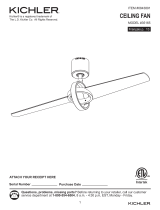 Kichler Lighting 35165 Manuel utilisateur
Kichler Lighting 35165 Manuel utilisateur
-
Kichler 35152 Manuel utilisateur
-
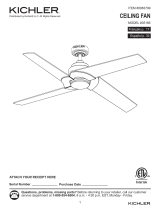 Kichler Lighting 35166 Manuel utilisateur
Kichler Lighting 35166 Manuel utilisateur
-
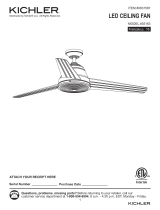 Kichler Lighting 35163 Manuel utilisateur
Kichler Lighting 35163 Manuel utilisateur
-
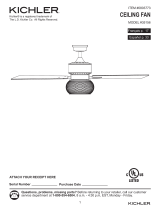 Kichler Lighting 35156 Manuel utilisateur
Kichler Lighting 35156 Manuel utilisateur
-
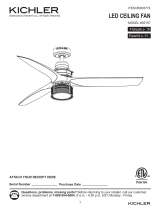 Kichler Lighting 35157 Manuel utilisateur
Kichler Lighting 35157 Manuel utilisateur
-
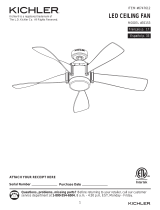 Kichler Lighting 35153 Manuel utilisateur
Kichler Lighting 35153 Manuel utilisateur
-
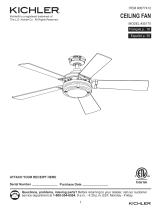 Kichler Lighting 35170 Manuel utilisateur
Kichler Lighting 35170 Manuel utilisateur
-
Kichler Lighting 35169 Manuel utilisateur







































